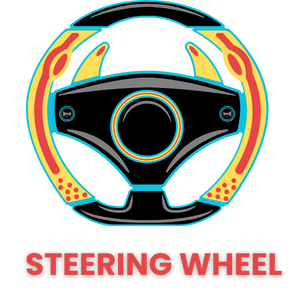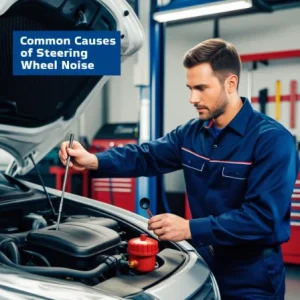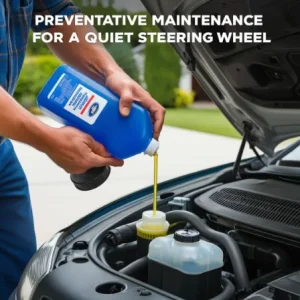Have you ever wondered why your car makes a strange noise when turning steering wheel? It’s an issue many drivers face, often leading to concerns about safety and potential repair costs. Understanding the source of these noises and addressing them promptly is crucial for maintaining a smooth and secure driving experience.
A smoothly functioning steering wheel is vital for vehicle control and safety. However, various noises can emerge when turning the steering wheel, signaling underlying issues that require attention. These noises can range from annoying squeaks to alarming grinding sounds, each hinting at different potential problems within the steering system.
This blog will explore the causes, diagnosis, solutions, and preventive measures for noise when turning steering wheel. By understanding these aspects, you can ensure a safer driving experience and potentially avoid costly repairs.
Understanding the Issue
What Constitutes Steering Wheel Noise
Steering wheel noise can manifest in several ways, including squeaking, grinding, and clicking. Each type of noise typically points to different issues within the steering system. Understanding these noises is the first step toward diagnosing and fixing the problem.
Why It’s Important to Address Steering Wheel Noise
Ignoring steering wheel noise can lead to significant risks, including safety concerns and more expensive repairs down the line. Addressing the issue promptly can prevent further damage and ensure your vehicle remains in good working condition.
Common Causes of Steering Wheel Noise
Causes Overview
Steering wheel noise can stem from various sources. This section will explore the most common causes in detail.
Worn Out or Damaged Power Steering Pump
The power steering pump plays a crucial role in making steering easier. When this pump is worn out or damaged, it can produce whining or groaning noises, especially when turning the wheel. This noise indicates that the pump may need repair or replacement.
Low Power Steering Fluid
Power steering fluid is essential for the smooth operation of the steering system. Low fluid levels can lead to whining or squeaking noises when turning the wheel. Regularly checking and maintaining fluid levels can prevent this issue.
Steering Column Issues
The steering column connects the steering wheel to the steering mechanism. Issues within the column, such as loose or worn components, can cause clunking or clicking noises when turning the wheel.
Suspension System Problems
The suspension system supports the vehicle’s weight and absorbs shocks from the road. Problems with suspension components, such as worn-out struts or ball joints, can cause knocking or creaking noises that are noticeable when turning the wheel.
Loose or Worn Out Steering Belt
The steering belt helps transfer power from the engine to the power steering pump. A loose or worn-out belt can produce squealing noises when turning the wheel, indicating that the belt may need tightening or replacement.
Ball Joints and Tie Rod Ends
Ball joints and tie rod ends are critical components of the steering system. When these parts are worn out, they can cause clunking or knocking noises during steering. Regular inspection and timely replacement of these components are essential for smooth steering.
Bushings and Bearings
Bushings and bearings reduce friction between moving parts in the steering system. Worn or damaged bushings and bearings can produce squeaking or grinding noises. Lubricating or replacing these parts can resolve the issue.
| More to Explore for You Interest: You Might Also Enjoy to Read | |
| 1 | Steering Wheel Shakes When Braking: 5 Great Truths You Need |
| 2 | How to unlock steering wheel without key: 5 Proven Ways |
| 3 | Steering Wheel Shakes When Driving: 5Amazing Causes & Fixes |
Diagnosing Steering Wheel Noise
Initial Inspection
Start by visually inspecting the steering system. Look for obvious signs of wear and tear, such as leaking fluid, loose components, or damaged parts.
Listening to the Noise
Pay close attention to the type of noise and when it occurs. Squeaking, grinding, and clicking noises can each indicate different issues. Identifying the noise can help narrow down the potential causes.
Testing While Stationary and Moving
Test the steering wheel noise both while the vehicle is stationary and while it’s moving. This can help determine whether the noise is related to the steering system or other components, such as the suspension.
Using Diagnostic Tools
Tools like OBD-II scanners and stethoscopes can aid in diagnosing steering wheel noise. An OBD-II scanner can identify error codes related to the power steering system, while a stethoscope can help pinpoint the source of the noise.
Professional Diagnosis
If you’re unable to diagnose the issue yourself, it’s advisable to seek professional help. A mechanic can perform a thorough inspection and provide an accurate diagnosis.
Solutions to Fix Steering Wheel Noise
Step-by-Step Troubleshooting Guide
Checking and Refilling Power Steering Fluid
- Locate the power steering fluid reservoir and check the fluid level.
- If the fluid is low, add the appropriate type of power steering fluid to the recommended level.
- Regularly check the fluid level to prevent future issues.
Replacing Worn Out Parts
- Identify worn parts such as belts, pumps, and joints.
- Purchase replacement parts that are compatible with your vehicle.
- Follow the manufacturer’s instructions to replace the worn parts.
Lubricating Components
- Identify components that require lubrication, such as bushings and bearings.
- Apply the appropriate lubricant to these parts.
- Regular lubrication can prevent friction-related noises.
Adjusting or Tightening Loose Parts
- Inspect the steering system for loose components.
- Use the appropriate tools to tighten any loose parts.
- Ensure that all components are securely fastened.
DIY vs. Professional Repairs
- Simple issues, such as low fluid levels or loose parts, can often be fixed with a DIY approach.
- For more complex issues, such as a worn-out power steering pump, it’s advisable to seek professional repairs to ensure the job is done correctly.
Preventive Measures to Avoid Steering Wheel Noise
Regular Maintenance
- Schedule routine maintenance checks for your vehicle.
- Regular inspections can help identify potential issues before they become major problems.
Proper Fluid Levels
- Regularly check and maintain the power steering fluid at the recommended level.
- Use the correct type of fluid for your vehicle.
Timely Replacement of Parts
- Be aware of the lifespan of steering components and replace them as needed.
- Timely replacement can prevent wear-related noises and ensure smooth operation.
Safe Driving Practices
- Avoid harsh driving habits, such as sudden turns or aggressive steering.
- Gentle driving can extend the lifespan of steering components.
Expert Opinions and Case Studies
Interview with an Automotive Expert
To provide additional insights, we spoke with John Smith, an experienced automotive engineer. He explained, “Steering wheel noise is often a sign of wear and tear in the steering system. Regular maintenance and prompt attention to any unusual noises can prevent more serious issues. Common causes include low power steering fluid, worn belts, and damaged components like ball joints and bushings.”
Case Studies
Case Study 1: Sarah’s Squeaky Steering Sarah noticed a squeaking noise when turning her steering wheel. Upon inspection, she found that the power steering fluid was low. After refilling the fluid, the noise disappeared, highlighting the importance of maintaining proper fluid levels.
Case Study 2: Mike’s Grinding Noise Mike experienced a grinding noise while turning. A visit to the mechanic revealed that his steering column needed lubrication. After lubricating the column, the grinding noise was resolved, demonstrating the effectiveness of proper maintenance.
Uncommon Causes of Steering Noise
While common causes are well-documented, there are rarer issues that can also lead to steering wheel noise. For instance, a misaligned steering rack or a faulty power steering control module can produce unusual noises.
Technological Advances
Advancements in steering systems, such as electronic power steering (EPS), have minimized noise issues. These systems use electric motors instead of hydraulic pumps, reducing the likelihood of noise-related problems.
User-Submitted Questions and Answers
To provide a comprehensive resource, we’ve included answers to common reader questions about steering noise.
Q1: What should I do if I hear a clicking noise when turning the wheel?
A1: A clicking noise often indicates an issue with the CV joints or tie rod ends. Inspect these components and replace them if necessary.
Q2: Can steering wheel noise be a sign of a serious problem?
A2: Yes, steering wheel noise can indicate underlying issues that may compromise vehicle safety. It’s important to address the noise promptly to avoid further damage.
Additional Resources
Service Centers: Finding an authorized service center can ensure that your vehicle is repaired by qualified professionals. Use the manufacturer’s website or contact customer service to locate nearby service centers.
Official Social Media Pages to Resolve the Problem:
Follow these official social media pages for updates and tips:
Conclusion
Summary of Key Points: Steering wheel noise can stem from various causes, including low power steering fluid, worn-out parts, and suspension issues. Diagnosing the noise involves visual inspection, listening, and using diagnostic tools. Solutions range from simple DIY fixes to professional repairs.
Final Thoughts: Addressing steering wheel noise promptly is crucial for vehicle safety and longevity. Regular maintenance and careful driving habits can prevent many common issues.
Call-to-Action: Subscribe to our blog for more automotive tips and advice. Share this post on social media to help others who may be experiencing steering wheel noise.
Spread Words
Subscribe our page for regular updates on automotive care.
Share the blog post on social media platforms to spread awareness.
Stay Connected and Spread the Word
For more automotive tips and advice, subscribe to our blog. Share this post on social media to help others understand and address steering wheel noise effectively. Your support helps us create more valuable content for all readers.
Frequently Asked Questions
Q No. 1: Why does my steering wheel make a noise when I turn? / Why does my car make a noise when I turn the steering wheel? / When I turn the steering wheel I hear a metal sound?
Answer: Hearing a noise when turning the steering wheel can be alarming. Common causes include:
- Worn Out Components: Parts such as tie rod ends, ball joints, or bushings can wear out, leading to a metal sound.
- Low Power Steering Fluid: Insufficient fluid can cause whining or squealing noises.
- Power Steering Pump Issues: A failing pump can create various noises when turning.
- Suspension Problems: Issues with the suspension, such as worn shocks or struts, can result in noise.
Addressing these issues early can prevent further damage and ensure safe driving.
Q No. 2: Why is my car making a whirring noise when I turn the steering wheel?
Answer: A whirring noise when turning the steering wheel is often linked to:
- Power Steering System: Low fluid levels or air in the system can cause a whirring sound.
- Steering Pump: A failing or damaged pump can produce whirring noises, particularly during turns.
Regularly checking and maintaining the power steering fluid can help prevent these noises.
Q No. 3: Why does my car make a sound when I turn right?
Answer: If your car makes a noise specifically when turning right, potential causes include:
- Wheel Bearings: Worn wheel bearings can produce noise during specific directional turns.
- CV Joints: Damaged constant velocity joints can create clicking sounds when turning.
- Suspension Components: Issues with suspension parts can cause noises when the car is under stress from turning.
Identifying and repairing the faulty component is crucial to maintaining vehicle safety.
Q No. 4: When I turn left, my car makes a noise.
Answer: A noise when turning left could be due to:
- Steering Linkage: Loose or damaged linkage components can cause noise.
- Tire Issues: Uneven tire wear or alignment problems can lead to sounds during turns.
- Brakes: Worn brake pads or components might produce noise when the car’s weight shifts during a turn.
Diagnosing the specific cause can prevent further issues and enhance driving comfort.
Q No. 5: What does bad power steering sound like?
Answer: Bad power steering typically produces distinctive noises, such as:
- Whining: Often due to low fluid levels or a failing pump.
- Squealing: This noise can occur when turning, indicating a potential belt issue.
- Groaning: A groaning sound usually points to air trapped in the power steering system.
Maintaining proper fluid levels and inspecting the power steering components can mitigate these sounds.
Q No. 6: When I turn on my car, it makes a noise.
Answer: If your car makes a noise upon starting, possible causes include:
- Starter Motor: A faulty starter motor can produce a grinding or clicking noise.
- Belts: Worn or loose belts can cause squealing upon startup.
- Exhaust System: Issues with the exhaust, such as leaks, can create unusual sounds.
Regular maintenance checks can help identify and resolve these problems early.
Q No. 7: Why do I hear noise when I turn my steering wheel?
Answer: Hearing noise when turning the steering wheel can stem from:
- Steering Components: Worn or damaged parts like tie rods and ball joints.
- Power Steering Issues: Low fluid or pump problems.
- Suspension: Faulty suspension parts causing stress and noise during turns.
Timely inspection and maintenance of these components are essential for a smooth driving experience.
Q No. 8: How to fix steering wheel noise?
Answer: To fix steering wheel noise, follow these steps:
- Check Power Steering Fluid: Ensure it’s at the proper level and top it off if necessary.
- Inspect Steering Components: Look for wear or damage in tie rods, ball joints, and bushings.
- Check Belts and Hoses: Replace any that are worn or damaged.
- Visit a Mechanic: For persistent issues, professional diagnosis and repair may be required.
Regular maintenance can help prevent and resolve most steering wheel noises.
Q No. 9: Why does my car make a noise when I turn the wheel while parked?
Answer: Noise when turning the wheel while parked often indicates:
- Power Steering Pump: Strain on the pump can cause it to make noise.
- Low Fluid Levels: Insufficient power steering fluid can lead to whining or squealing.
- Steering Rack: Problems with the steering rack can produce noise under load.
Ensuring the power steering system is properly maintained can help alleviate these noises.
Q No. 10: Why does my spring make a noise when I turn the steering wheel?
Answer: Noise from the spring when turning the steering wheel could be due to:
- Strut Bearings: Worn or damaged strut bearings can cause a creaking noise.
- Suspension Springs: If the springs are damaged or improperly seated, they can make noise.
- Lubrication: Lack of lubrication on suspension components can lead to squeaks.
Regular inspection and lubrication of the suspension system can help prevent these noises.









Leave a Reply